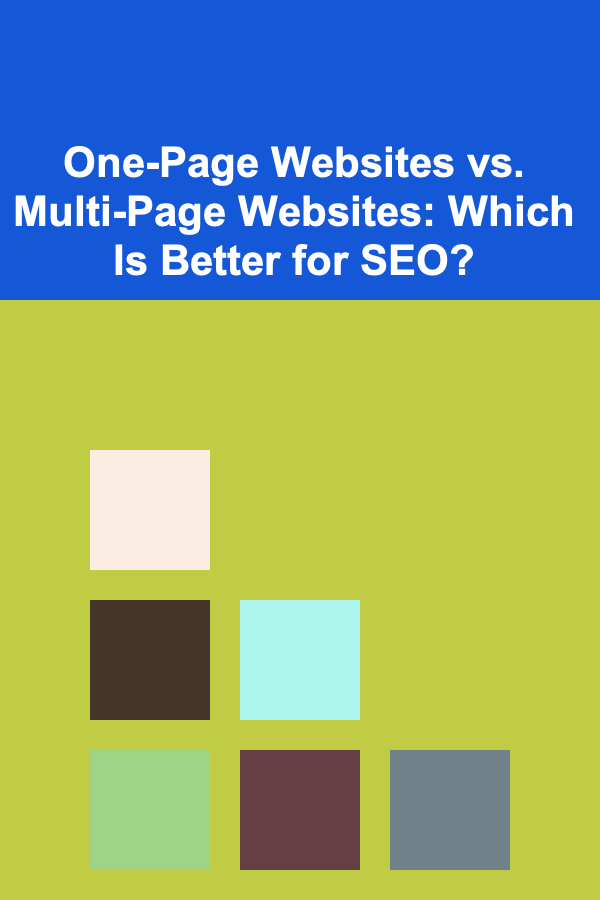
One-Page Websites vs. Multi-Page Websites: Which Is Better for SEO?
ebook include PDF & Audio bundle (Micro Guide)
$12.99$10.99
Limited Time Offer! Order within the next:

In the modern digital world, businesses face the ongoing challenge of building websites that not only serve the needs of their users but also perform well in search engine results. SEO (Search Engine Optimization) is an essential element of website design, as it directly impacts how a website ranks on search engines like Google, Bing, and others. One of the significant debates in web design circles is whether a one-page website or a multi-page website is more beneficial for SEO.
This article explores the key factors involved in this debate, providing an in-depth analysis of the advantages and disadvantages of both one-page and multi-page websites. We will discuss how each type affects SEO, the factors that influence search engine rankings, and which type of website might be best for different types of businesses. Ultimately, the goal is to understand how SEO works in relation to these website structures and which is better suited to your specific needs.
The Basics of One-Page Websites and Multi-Page Websites
Before diving into the SEO implications, it's important to define what we mean by one-page and multi-page websites.
What is a One-Page Website?
A one-page website is exactly as it sounds---a website where all content is contained on a single page. Users navigate the content through scrolling or by clicking anchor links that take them to different sections of the page. These websites typically present a linear flow of information, often focusing on a single topic, product, or service. One-page websites are typically used for events, portfolios, promotional campaigns, or small businesses that want to convey a singular message.
What is a Multi-Page Website?
A multi-page website, on the other hand, is composed of multiple pages, each dedicated to different types of content or purposes. These websites generally have a homepage, along with separate pages for services, products, blogs, contact information, about us sections, and more. Multi-page websites allow businesses to display a variety of content and cater to users with diverse needs. For example, an e-commerce site might have multiple product pages, a shopping cart page, and various other resources spread across different pages.
How SEO Works and What Affects It
Before we can dive into how one-page and multi-page websites perform for SEO, it's crucial to understand how search engine optimization works.
Keyword Relevance
One of the key factors in SEO is keyword relevance. This refers to how well a webpage matches the search intent of users who enter specific queries. Search engines crawl web pages and evaluate their relevance to the keywords they rank for. The better optimized a webpage is for its target keywords, the higher it will rank in search engine results pages (SERPs).
Content Quality
Content quality is a cornerstone of SEO. Websites that offer valuable, informative, and engaging content are more likely to perform well in search rankings. Search engines prioritize high-quality content that satisfies user intent, so businesses need to create content that addresses the questions and needs of their target audience.
Backlinks
Backlinks, or incoming links from other websites, are another crucial factor for SEO. Search engines view backlinks as a signal of trustworthiness and authority. The more high-quality backlinks a website has, the more likely it is to rank higher in search results.
Site Structure and Internal Linking
Site structure and internal linking are also important for SEO. Search engines need to understand how a website's pages are related to one another. A well-structured website with clear internal links makes it easier for search engines to crawl and index content.
Page Speed
Page speed is a critical ranking factor, especially for mobile users. Websites that load quickly provide a better user experience, which is something that search engines like Google take into consideration when ranking websites.
SEO on One-Page Websites
One-page websites have a unique design, which presents both advantages and challenges from an SEO perspective. Let's explore how one-page websites perform with SEO.
Advantages of One-Page Websites for SEO
1. Focused Keyword Targeting
A one-page website allows you to focus on a limited number of keywords. Since all content is on a single page, you can tailor the page's content, headings, meta tags, and other elements to target specific keywords. This means you can optimize the entire page for a set of related keywords, which can improve your ranking for those terms.
2. Improved User Experience
One of the most significant benefits of a one-page website is its simplicity. Users don't need to navigate between different pages to find the information they need. A seamless user experience tends to reduce bounce rates, which is a ranking factor for SEO. Search engines prioritize user-friendly websites, so if visitors stay on your page longer and engage with your content, it can result in a better SEO performance.
3. Mobile Optimization
One-page websites are generally easier to optimize for mobile users, and mobile-friendliness is an important ranking factor. Since all the content is contained within a single page, it's simpler to design and optimize the website for mobile devices. A smooth, responsive design improves user experience on smartphones and tablets, which can positively influence SEO rankings.
4. Faster Load Times
With fewer elements and less overall content, one-page websites often load faster than multi-page websites. Page speed is a ranking factor for SEO, especially on mobile devices. Websites that load quickly improve the user experience and can rank higher in search engine results.
Disadvantages of One-Page Websites for SEO
1. Limited Keyword Targeting
While focusing on a few keywords can be beneficial, one-page websites are limited in their ability to target a broad set of keywords. Multi-page websites have the advantage of being able to target different keywords across different pages, increasing their overall visibility in search engine results. For example, a blog section, product pages, and service pages can each target distinct keywords, whereas a one-page site can only focus on one primary set of keywords.
2. No Deep Content Structure
One of the challenges of one-page websites is that they often lack the depth of content needed to rank for competitive keywords. Multi-page websites have the ability to create more in-depth content and target specific aspects of a product, service, or industry, giving them an edge in terms of SEO. The shallow content on a one-page website might not be enough to rank for high-competition keywords.
3. Limited Opportunities for Backlinks
Backlinks play a crucial role in SEO, but one-page websites typically don't have as many opportunities to earn backlinks. Since all the content is on a single page, there's no opportunity to create multiple, keyword-optimized pages that could attract links from other websites. In contrast, multi-page websites have more individual pages to optimize and promote, which increases their chances of earning backlinks.
4. Difficulty with Analytics and Tracking
Another disadvantage of one-page websites is that tracking user behavior and performance through analytics can be more difficult. While it is possible to track how visitors interact with a one-page website, you lose the granular insights that come from tracking multiple pages. Multi-page websites allow for detailed tracking of how visitors navigate between pages, which can help you fine-tune your SEO strategy.
SEO on Multi-Page Websites
Multi-page websites are generally considered to be more SEO-friendly, especially for businesses that need to rank for multiple keywords and cover a range of topics. Let's look at how multi-page websites perform for SEO.
Advantages of Multi-Page Websites for SEO
1. Broader Keyword Coverage
With multiple pages on a multi-page website, you can target a wider range of keywords. For example, you can have separate pages for different products, services, and blog posts, each optimized for its specific keyword set. This increases the overall visibility of the website and enhances its chances of ranking for multiple search terms. Multi-page websites allow for more targeted SEO strategies across various sections of the site.
2. In-Depth Content
Multi-page websites allow businesses to create detailed content on different subjects. For example, if you are running an e-commerce website, each product page can include specific details, reviews, and images. This level of in-depth content makes it easier to rank for long-tail keywords and niche topics. Search engines tend to favor websites with more comprehensive, detailed content, which is a major advantage of multi-page websites.
3. More Backlink Opportunities
Each page on a multi-page website offers a potential target for backlinks. Pages that are optimized for specific keywords are more likely to attract inbound links, especially if they offer valuable information, products, or services. The more pages you have, the more opportunities you have to earn backlinks, which is a key ranking factor in SEO.
4. Better Analytics and Tracking
Multi-page websites provide more detailed insights into how visitors are interacting with your site. You can track which pages get the most traffic, where users are dropping off, and what actions they are taking on specific pages. This information is invaluable for adjusting your SEO strategies and improving user experience.
Disadvantages of Multi-Page Websites for SEO
1. Complex SEO Management
With multiple pages comes the need to manage SEO for each individual page. This includes optimizing meta tags, keywords, content, and backlinks for every page. A multi-page website requires more resources and time to maintain, and if not properly managed, it can lead to SEO inconsistencies and missed opportunities.
2. Potential for Slow Load Times
While multi-page websites offer a lot of flexibility, they can also suffer from slow load times due to the large amount of content and images. This can be a disadvantage from an SEO perspective, as page speed is an important ranking factor. A slow website can lead to higher bounce rates and lower rankings in search engines.
Which is Better for SEO: One-Page or Multi-Page Websites?
The answer to whether one-page or multi-page websites are better for SEO depends largely on the goals of the business and the complexity of its offerings.
When to Choose a One-Page Website
A one-page website is ideal for businesses with a simple product or service offering. It's best for small businesses, portfolios, landing pages, and events that need a straightforward web presence. If your goal is to focus on a specific target audience or a singular message, a one-page website can provide an excellent user experience and may perform well for a limited set of keywords.
When to Choose a Multi-Page Website
A multi-page website is better suited for businesses with a variety of products or services, or those that need to target a broad range of keywords. Large businesses, e-commerce sites, and content-heavy websites will benefit more from the scalability, depth, and keyword coverage that a multi-page structure provides. A multi-page website also provides greater flexibility for adding new content and features over time.
Conclusion
Both one-page and multi-page websites have their strengths and weaknesses in terms of SEO. One-page websites offer simplicity and focus, but they are limited in their ability to target multiple keywords and provide in-depth content. Multi-page websites, on the other hand, offer greater flexibility and scalability, making them better suited for businesses with diverse offerings and complex SEO needs.
Ultimately, the best choice depends on the goals of the business, the complexity of its offerings, and the resources available to manage the website. By carefully considering these factors, businesses can make an informed decision on whether a one-page or multi-page website is better for their SEO strategy.
Reading More From Our Other Websites
- [Home Party Planning 101] How to Host a Themed Dinner Party with Unique Decor Ideas
- [Home Cleaning 101] How to Clean Your Home Using Eco-Friendly Products
- [Personal Care Tips 101] How to Style Your Hair with Hair Mousse for a Natural Look
- [Personal Care Tips 101] How to Develop a Sustainable Personal Care Routine
- [Organization Tip 101] How to Maintain an Inventory of Your Essential Oils
- [Mindful Eating Tip 101] Mindful Eating vs Dieting: Debunking Myths and Discovering Real Nutrition Success
- [Home Pet Care 101] How to Socialize a Shy Dog
- [Home Storage Solution 101] How to Declutter and Organize Your Home Like a Pro
- [Metal Stamping Tip 101] Seamless Synergy: How CAD/CAM Integration Revolutionizes Metal Stamping Design
- [Home Holiday Decoration 101] How to Compare Home Depot Christmas Trees for Quality and Style

Exploring Ways to Generate Passive Income with Deep Learning
Read More
How to Create a Minimalist Photo Album
Read More
How to Set Up a Rainwater Harvesting System
Read More
How to Transition to a New Financial Advisor
Read More
10 Tips for Yearly Garden Maintenance: A Seasonal Checklist
Read More
How to Press Flowers in a Microwave: A Quick Guide
Read MoreOther Products

Exploring Ways to Generate Passive Income with Deep Learning
Read More
How to Create a Minimalist Photo Album
Read More
How to Set Up a Rainwater Harvesting System
Read More
How to Transition to a New Financial Advisor
Read More
10 Tips for Yearly Garden Maintenance: A Seasonal Checklist
Read More